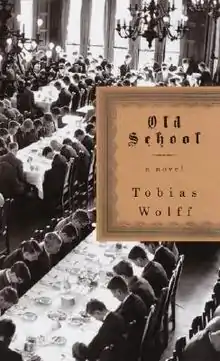Old School (novel)
Old School is a novel by Tobias Wolff. It was first published on November 4, 2003, after three portions of the novel had appeared in The New Yorker as short stories.
 Cover of Old School | |
| Author | Tobias Wolff |
|---|---|
| Country | United States |
| Language | English |
| Publisher | Vintage Books |
Publication date | November 4, 2003 |
| Pages | 195 p. |
Plot
The book is narrated by a school senior ("sixth former" in prep-school vernacular) at an unnamed elite boarding school in the northeastern United States in 1960–61. The unnamed protagonist is a scholarship student who comes from a middle-class family.
He aspires to be a writer, and the school he attends is an embodiment of a certain kind of academic fantasy, where non-English masters (teachers are "masters" here) "floated at the fringe of [the English masters'] circle, as if warming themselves at a fire," and literature is still believed to hold the key to the soul. Robert Frost, Ayn Rand, and Ernest Hemingway, with each of whom the narrator crosses paths, appear in the story, dispensing wisdom, pseudo-wisdom, vitriol. These literary appearances amount to creative satires of these authors, especially Ayn Rand. The novel revolves around themes of adolescence, class, and the role of literature.
The Penguin Random House publisher's blurb describes the book thus:
The protagonist of Tobias Wolff's shrewdly—and at times devastatingly—observed first novel is a boy at an elite prep school in 1960. He is an outsider who has learned to mimic the negligent manner of his more privileged classmates. Like many of them, he wants more than anything on earth to become a writer. But to do that he must first learn to tell the truth about himself. The agency of revelation is the school literary contest, whose winner will be awarded an audience with the most legendary writer of his time. As the fever of competition infects the boy and his classmates, fraying alliances, exposing weaknesses, Old School explores the ensuing deceptions and betrayals with an unblinking eye and a bottomless store of empathy. The result is further evidence that Wolff is an authentic American master.[1]
In his review for the New York Times, critic A.O. Scott writes that Old School is "about nothing if not the making of a writer — though it is also, just as plainly, about a writer's failure."[2]
Reception
This book was a finalist for the 2004 PEN/Faulkner Award for Fiction.[3]
The review for Old School in the Los Angeles Times noted, "...Wolff again proves himself a writer of the highest order: part storyteller, part philosopher, someone deeply engaged in asking hard questions that take a lifetime to resolve."[4]
The novel was chosen as a National Endowment for the Arts "Big Read" book for communities to read together.[5] The Libraries of Greater Kansas City chose Old School as their Big Read in 2009.[6]
References
- "Old School by Tobias Wolff". Penguin Random House. Retrieved 3 August 2017.
- Scott, A.O. (2003). "Famous Writers School". New York Times. Retrieved 3 August 2017.
- "Past Winners & Finalists". PEN/Faulkner Foundation. Archived from the original on 21 December 2013. Retrieved 3 August 2017.
- Ciuraru, Carmela (2003). "Lessons learned in 'Old School'". Los Angeles Times. Archived from the original on 3 August 2017. Retrieved 3 August 2017.
- "Old School by Tobias Wolff". NEA Big Read. Retrieved 3 August 2017.
- "Old School Related Reading". Kansas City Public Library. 2009. Retrieved 3 August 2017.